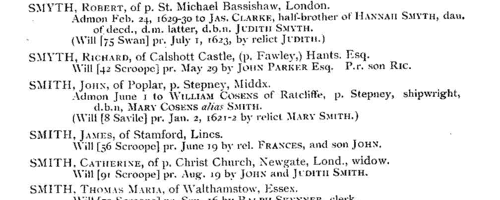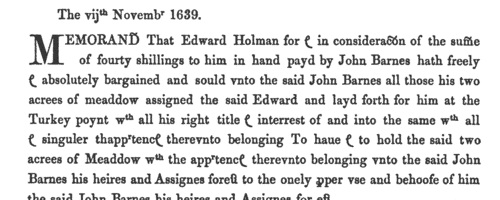Cutbert Surname Ancestry ResultsOur indexes 1000-1999 include entries for the spelling 'cutbert'. In the period you have requested, we have the following 34 records (displaying 1 to 10): Single Surname Subscription | | | Buying all 34 results of this search individually would cost £198.00. But you can have free access to all 34 records for a year, to view, to save and print, for £100. Save £98.00. More... |
These sample scans are from the original record. You will get scans of the full pages or articles where the surname you searched for has been found. Your web browser may prevent the sample windows from opening; in this case please change your browser settings to allow pop-up windows from this site. Close Rolls
(1313-1318)
The close rolls of the 7th, 8th, 9th, 10th and 11th years of the reign of king Edward II record the main artery of government administration in England, the orders sent out day by day to individual officers, especially sheriffs of shires: they are an exceptionally rich source for so early a period. In amongst this official material, the rolls were also used as a way of recording many acknowledgments of private debts and contracts between individuals. Most of the contents relate to England, but there are also entries concerning Wales, Scotland, Ireland and the English possessions in France.CUTBERT. Cost: £4.00.  | Sample scan, click to enlarge

| Close Rolls
(1447-1454)
The close rolls of the 26th to 32nd years of the reign of king Henry VI record the main artery of government administration in England, the orders sent out day by day to individual officers, especially sheriffs of shires: they are an exceptionally rich source for so early a period. There is also some material relating to Wales, Scotland, Ireland and the English possessions in France. CUTBERT. Cost: £4.00.  | Sample scan, click to enlarge

| London Liverymen: Barber Surgeons
(1537)
J. Caley, F.R.S., F.S.A. transcribed this 'curious record' found in the Chapter House, Westminster, 'a list of the freemen of the various companies resident in London and Westminster; from Thomas Lewyn being mentioned as sheriff, it appears it was made in the year 1537.' Thirty-seven companies are listed, comprising 2400 individuals: Armourers, Bakers, Barber Surgeons, Blacksmiths, Brewers, Broiderers, Clothworkers, Coopers, Cordwainers, Curriers, Cutlers, Drapers, Fishmongers, Fletchers, Founders, Freemasons, Fruiterers, Goldsmiths, Grocers, Haberdashers, Innholders, Ironmongers, Joiners, Leather Sellers, Merchant Taylors, Painter Stainers, Plasterers, Plumbers, Saddlers, Salters, Skinners, Spurriers, Tallow Chandlers, Tilers, Vintners, Wax Chandlers and Weavers. CUTBERT. Cost: £6.00.  | Sample scan, click to enlarge

| Tradesmen of York
(1272-1558)
No man or woman could trade in the city of York without having obtained 'freedom' of the city.Their names were recorded on the 'Freemen's Roll', or Register of the Freemen of the City of York, which contains about 19,900 names for this period. A list of names was prepared for each year, the year being here reckoned as starting at Michaelmas (29 September) until 1373, and thence at Candlemas (2 February). Each annual list starts with the name of the mayor and the camerarii or chamberlains. The chamberlains were freemen charged with the duty of receiving the fees of the new freemen; of seeing that only freemen traded in the city; and of preparing this roll, which was compiled from the names on their own account books from the receipts for the fees. There are three groups of freemen: those who obtained freedom after serving out an apprenticeship to a freeman; the children of freemen; and those who claimed freedom by 'redemption', i. e. by purchase or gift from the Mayor and Court of Aldermen.
CUTBERT. Cost: £2.00.  | Sample scan, click to enlarge

| London and Middlesex Feet of Fines
(1485-1569)
Pedes Finium - law suits, or pretended suits, putting on record the ownership of land in London and Middlesex.CUTBERT. Cost: £4.00.  | Sample scan, click to enlarge

| Traders in Canterbury
(1392-1592)
No man or woman could trade in the city of Canterbury without having obtained 'freedom' of the city, unless they paid an annual fee to do so. Admissions of freemen were recorded on the Chamberlains' Accounts of the city, which were prepared annually from Lady Day (25 March) to Lady Day until 1752, and thereafter each set runs from 1 January to 31 December. The accounts for 1392 are incomplete, but thereafter until 1800 there is a complete series except for the years 1455 to 1457 and the year 1552-3. Joseph Meadows Cowper, Honorary Librarian to the Corporation, transcribed and privately printed in 1904 the lists of the Intrantes - those persons, not being free of the city, who paid the annual fine to trade - for the period 1392 to 1592. The names are arranged by ward (Burgate, Newyngate, Westgate, Worgate and Northgate, and give full name, (sometimes) occupation, and fee paid. CUTBERT. Cost: £4.00.  | Sample scan, click to enlarge

| PCC Probates and Administrations
(1630)
The Prerogative Court of Canterbury's main jurisdiction was central and southern England and Wales, as well as over sailors &c dying abroad: these brief abstracts, compiled under the title "Year Books of Probates", and printed in 1902, usually give address, date of probate and name of executor or administrator. They are based on the Probate Act Books, cross-checked with the original wills, from which additional details are, occasionally, added. The original spelling of surnames was retained, but christian and place names have been modernised where necessary.CUTBERT. Cost: £2.00.  | Sample scan, click to enlarge

| Inhabitants of Cambridge
(1504-1635)
Cambridge comprised fourteen ancient parishes, plus the university (which was extra-parochial), in the diocese of Ely. The church of St Mary the Great (as opposed to St Mary the Less) in the Market Place (juxta forum) has churchwardens' accounts surviving from 1504 onwards. Those from 1504 to 1635 were transcribed by J. E. Foster for the Cambridge Antiquarian Society and published in 1905. The two churchwardens were chosen annually: the previous year's churchwardens each chose another parishioner: those two then each chose three other parishioners: the resulting eight then chose the new year's churchwardens, the wardens of the Light of the Rood, and the wardens of the Mass of Jesus. Auditors were also chosen, usually out of the eight, to examine all the wardens' accounts at the end of the year. The churchwardens' accounts are largely concerned with the costs of repair of the church and its furnishings, and include the names of tradesmen and workmen. Each Easter a rate called Easter money was raised was raised from all householders in the parish, and additional rates are occasionally levied for unusual expenses, such as steeple reconstruction. These 'Easter book' lists give a complete list of householders for the parish, excepting the poor. The church's income also included the rents from some houses in the parish, and the names of the tenants appear. The offices of the Light of the Rood and the Mass of Jesus were abolished during the Reformation. The accounts of the Light of the Rood, i. e., for candles burnt before the crucifix, often include a list of sums received for funerary diriges (dirges) for the year, from which the year of death of the more prosperous parishioners can be traced in this early period. CUTBERT. Cost: £4.00.  | Sample scan, click to enlarge

| The Founders of New Plymouth
(1620-1651)
(New) Plymouth colony was settled 120 Puritan families from England who landed there in 1620. New Plymouth and Massachusetts Bay were united in 1692 as Massachusetts. The manuscript volume in which the earliest records of the colony are entered is entitled "Plymouth Colony Records, Deeds, &c., Vol. I, 1627-1661" and "Book of Indian Records for their Lands". This book was edited by David Pulsifer and published in 1861 by order of the legislature of the Commonwealth of Massachusetts. The principal contents are records of the establishment of the colony, the initial land grants, distribution of the few cattle brought across the Atlantic, and the subsequent deeds by which land transfers took place, and servants were indentured.CUTBERT. Cost: £4.00.  | Sample scan, click to enlarge

| Suffolk Archdeaconry Marriage Licences: Bridegrooms
(1664)
Marriage licence bonds in the Suffolk Archdeaconry Registry at Ipswich, abstracted and printed by Frederick Arthur CrispCUTBERT. Cost: £4.00.  | Sample scan, click to enlarge

|
Research your ancestry, family history, genealogy and one-name study by direct access to original records and archives indexed by surname.
|












